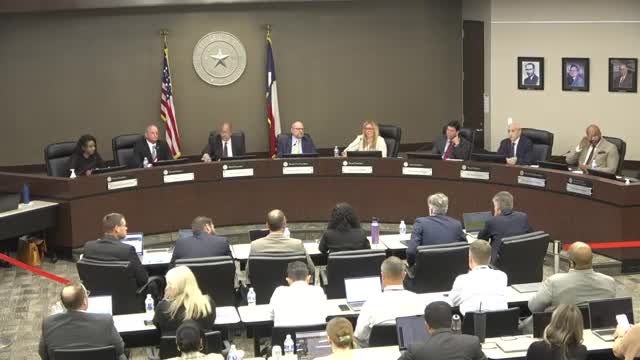Board faces turmoil over potential superintendent termination vote
July 24, 2024 | HUMBLE ISD, School Districts, Texas

This article was created by AI summarizing key points discussed. AI makes mistakes, so for full details and context, please refer to the video of the full meeting. Please report any errors so we can fix them. Report an error »

During a recent school board meeting, discussions centered around the potential termination of the superintendent, highlighting tensions among board members and procedural implications of such a decision.
One trustee expressed concerns about the district's current state, attributing its disarray to past conflicts over leadership votes, specifically referencing a disagreement regarding the election of the board president. This trustee claimed that the discord began when another member refused to support the current president, suggesting that this moment marked the start of ongoing issues within the district.
The conversation shifted to the procedural steps that would follow if the board voted to terminate the superintendent. Legal counsel outlined the process, stating that if a termination vote were to pass, the superintendent would receive written notice and have 15 days to appeal to the Texas Education Agency (TEA). Should an appeal occur, an independent hearing examiner would be appointed to conduct a hearing akin to a mini-trial, allowing both the superintendent and the district to present their cases. The hearing would take place within 60 to 105 days, after which the examiner would provide findings and recommendations to the board, who would then vote on whether to uphold or modify the recommendations.
This meeting underscored the complexities of governance within the district and the potential ramifications of leadership changes, emphasizing the importance of due process in such significant decisions.
One trustee expressed concerns about the district's current state, attributing its disarray to past conflicts over leadership votes, specifically referencing a disagreement regarding the election of the board president. This trustee claimed that the discord began when another member refused to support the current president, suggesting that this moment marked the start of ongoing issues within the district.
The conversation shifted to the procedural steps that would follow if the board voted to terminate the superintendent. Legal counsel outlined the process, stating that if a termination vote were to pass, the superintendent would receive written notice and have 15 days to appeal to the Texas Education Agency (TEA). Should an appeal occur, an independent hearing examiner would be appointed to conduct a hearing akin to a mini-trial, allowing both the superintendent and the district to present their cases. The hearing would take place within 60 to 105 days, after which the examiner would provide findings and recommendations to the board, who would then vote on whether to uphold or modify the recommendations.
This meeting underscored the complexities of governance within the district and the potential ramifications of leadership changes, emphasizing the importance of due process in such significant decisions.
View full meeting
This article is based on a recent meeting—watch the full video and explore the complete transcript for deeper insights into the discussion.
View full meeting
